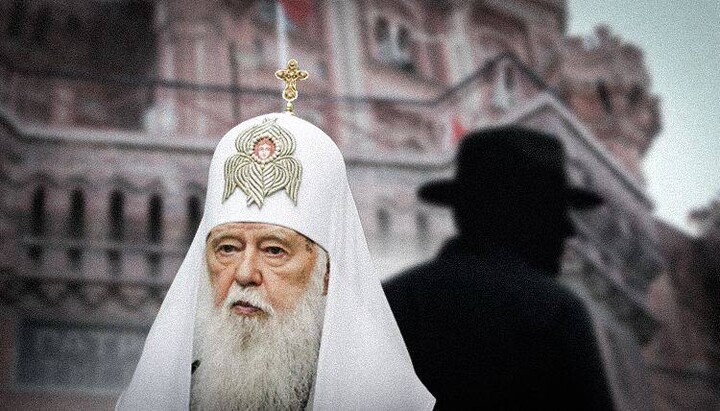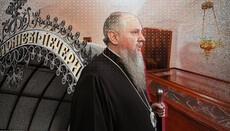Orthodoxy in Ukraine: Filaret's plan and officials' idea

Against the background of meetings of the Phanar delegation with UOC and OCU reps, the meeting with Filaret Denisenko went completely unnoticed, but it better be.
In Ukraine, the former “Patriarch” of Kyiv and “Honorable Patriarch” of the OCU has recently disappeared from the screens. The authorities have declared a “media boycott” against him. And the reason is obvious – Denysenko is a highly problematic figure for “Ukrainian Orthodoxy” and for the Ukrainian authorities. Judge for yourself.
Who is Filaret?
Filaret is a person who, back in the 90s, broke away from the Russian Orthodox Church and, practically from scratch (albeit with state support), created the "Ukrainian Church". The fact that it was originally a purely political project doesn't change the matter – Filaret managed to give it life. A parasitic life on the body of the canonical Church, but still. Denisenko is perceived as a true Ukrainian, free from any "Muscovite" influences, and only those who still have old printed issues of the "Orthodox Herald" could accuse him of sympathies towards Moscow.
On the pages of this publication, Denysenko explained back in 1989 why the Ukrainian Exarchate should not be called the "Russian Church". And on the pages of another resource, "Soviet Patriot", Filaret stated that he saw no need for services to be conducted in the Ukrainian language. But who will remember this now? No one.
So, as Metropolitan of Kyiv, he broke away and created the UOC-KP. For many years, he "worked" on getting his structure recognized by global Orthodoxy. For a long time, nothing happened, and it continued until Viktor Yushchenko became the President of Ukraine. By then, many understood that recognition of the UOC-KP by the Phanar was only a matter of time. And Filaret's "hour of glory" came in 2018 when the Phanar lifted the anathemas against him, his creation called the OCU received the Tomos, and Filaret was given hope to manage the structure. The authorities rejoiced, the insignificant Dumenko became the "head", but… for some reason both the Phanariots and Denysenko did not join in the general euphoria. The former understood that "something went wrong", and the latter knew exactly "what went wrong". Very soon, the entire Orthodox world would learn about this… Stripped of the real power he desired so much, Filaret broke away from the OCU. What happened next does not fit into any church canons.
The schism of the schism: Why hasn't Filaret been punished?
Let's recall that schism is nothing new for Denysenko. He had already broken away from the ROC, so he simply followed a familiar path. Quite literally, he announced his departure from the Orthodox Church of Ukraine (OCU), convened a "council" of the UOC-KP and within a few months ordained about ten "bishops" to form a full-fledged "synod". From the standpoint of logic, canon law, and common sense, Filaret clearly and unequivocally created a new schism. Therefore, according to church rules, he should have been punished. But here, the Phanar and the OCU faced a significant problem.
Punishing Denysenko for schism would mean acknowledging their own mistakes and admitting that his excommunication by the ROC more than 20 years ago was entirely justified.
On the other hand, punishing him would also mean punishing the "father" and creator of "Ukrainian Orthodoxy". Moreover, it would validate the position of the UOC, which has long warned about the schismatic activities of its former head. Therefore, the Phanar decided to wait for Denysenko's death, reasoning that, given his age of over 90, he wouldn't live much longer. However, the "old man", as Filaret was called in the OCU, has proven surprisingly resilient. Even six years after the Tomos bestowal, not only is he still alive but he also retains amazing sobriety of thought and the ability to act. Thus, continuing to ignore his existence is no longer feasible, especially for the Phanariots.
When Patriarch Bartholomew granted the Tomos to the OCU, he declared to the entire Orthodox world that he was doing so to unify Ukrainian Orthodoxy. In reality, he only exacerbated the situation. Ukraine still has two schismatic groups and the UOC, just as before. The Tomos only intensified the conflict, escalating aggression and hatred toward UOC representatives to unprecedented levels, no longer confined to words alone. As a result, Patriarch Bartholomew began to face questions.
For example, it is well-known that the heads of some Local Churches, during informal meetings with Patriarch Bartholomew, directly asked him what good he had done for Ukraine and its believers by granting the Tomos to the schismatics. These questions have also been raised publicly. Recently, Bulgarian Patriarch Daniel stated that the Tomos only intensified the persecution of Orthodox Christians in Ukraine. Even earlier, Albanian Archbishop Anastasios pointed out that this document did not bring the promised peace to our land.
Filaret's "plan": a patriarchate
Since "Patriarch" Filaret has mentioned several times that he has a plan to resolve the current situation, the Phanar delegation decided to meet with him. A year ago, when he first presented this plan, no one took it seriously, as Denysenko himself acknowledged. However, now the possibility of implementing this plan (in one form or another) no longer seems so far-fetched. So, what exactly was Filaret talking about?
In early June 2022, Denysenko published an appeal on the UOC-KP website, where he discussed the complicated situation in Ukrainian Orthodoxy. He stated that "all branches of our divided Ukrainian Orthodox Church can unite around the idea of full autocephaly with a patriarchal structure at its head". According to Filaret, "any dependence on other thrones is a sign of weakness and contributes to the disunity of Ukrainians", and "only the Kyiv Patriarchal Throne can unite us all and ensure the proper development of the Ukrainian Orthodox Church".
Naturally, Denysenko's call for a patriarchal structure for the "Ukrainian Church" was perceived solely as yet another expression of the aged schismatic's power ambitions.
However, just a year later, on July 8, 2023, Ukrainian President Volodymyr Zelensky requested the Phanar head to grant the OCU Patriarchal status. This request was initiated by Andriy Sybyha, a former deputy head of the President's Office and a strong supporter of the OCU, who hoped that this move would somehow thwart Russia.
But it is undeniable that Denysenko has always been the primary advocate of this idea. Although Patriarch Bartholomew carefully declined the proposal at the time, it likely hasn't died in the corridors of power, and it may still be revived in some form.
Moreover, the "form" or "plan for uniting Ukrainian Orthodoxy" was again proposed by Filaret himself. In his address on June 2, 2022, he suggested the following: "As the senior bishop by consecration and age in the Orthodox Church, I initiate the convocation of an All-Ukrainian Local Orthodox Council, in which representatives of all three branches of Ukrainian Orthodoxy would participate. In my view, this council should decide on uniting into a single local Apostolic Ukrainian Orthodox Church with a patriarchal administration and proclaim full autocephaly. I also call upon Church representatives to meet to discuss the council's agenda and determine the date for its convening."
Again, Filaret's words may not be taken seriously. But it is worth noting that the Phanar delegation did go to meet with him, despite the clear schism on his part.
Filaret's "plan": everyone keeps their interests
But that’s not all. Denysenko further explained how the new "patriarchate" would function. According to him, "all the heads of their respective Churches will remain in their positions".
He clarified that "everyone would unite under the Ukrainian Patriarchate, and then Onuphry would continue managing his parishes as before, Epifaniy would oversee his eparchies and remain in his position".
Filaret went on to say that "a patriarch would be elected, and when there is a patriarchate in Ukraine, it will truly be an independent Church, which will be a great power for Ukraine."
He added, "Imagine if today the Ukrainian Churches were united into one; there would be no problems with the Crimea or Donbas. It would be one state and one Ukrainian Church. And we are striving for this. Shall we achieve it? We definitely shall!" he declared just a year ago.
Filaret's plan’ is the following:
- Denysenko initiates a council in which all ‘three branches’ of Ukrainian Orthodoxy – the UOC, the OCU and the UOC-KP – will take part.
- At this council, a patriarch is chosen, under whose omophorion all ‘three branches’ will be able to coexist peacefully.
- At the same time, each of the current primates, in the event that he does not become patriarch, continues to govern his eparchies.
Let's hypothetically assume that the Phanar agrees to such a scenario. Will the problems disappear in that case?
No. Because the most important problem – the absence of canonical ordinations among the OCU clergy – remains, which currently makes it impossible for UOC hierarchs to concelebrate with OCU representatives. Filaret's "plan" does not address this problem at all. Moreover, even if the mentioned council acts out of economy and recognizes all the "ordinations" of the OCU and the UOC-KP, they are unlikely to be recognized by those Local Churches that have already expressed their stance on this matter – such as the Albanian, Polish, Serbian, Bulgarian Churches, and so on. Thus, this problem cannot be resolved solely within Ukraine. Add to this the fact that within the OCU, and even more so within the UOC-KP, there is a large number of ordinary opportunists who were banned from the UOC for serious moral and canonical offences and then went into schism. Those who banned them are also unlikely to want to concelebrate with them.
Of course, the Phanariots might offer the "Bulgarian solution" to the "new Ukrainian Church": only those bishops and priests who wish to do so serve with representatives of the OCU, without sanctions from everyone else. But even here, the problem will not be resolved, it will only worsen. Because, on top of the lack of ordinations, there is also the moral rejection of everything associated with the OCU due to the aggression and hatred its representatives have shown towards the UOC.
However, we would not completely dismiss Filaret's "plan" despite its fantastical nature. It's likely that the idea of uniting all Ukrainian Orthodoxy into one Church will never die in the President's Office.
Similarly, the belief of the Constantinople Patriarchate that Kyiv is its original territory, which only temporarily and mistakenly belonged to the Russian Orthodox Church for over 300 years, will never die. The Phanar wants to control this territory, and therefore is unlikely to agree to Filaret's proposal. At the same time, the President's Office will always push for the "unity" of Ukrainian Churches – both in a year and in ten years.
And amid all these plans are the faithful of the UOC, who are seeking Christ and perceive all this turmoil as a temptation.
It is difficult to say which plan for the unification of Ukrainian Orthodoxy will win out. We can assume that at this stage some kind of compromise will be reached: a transitional status for the UOC with which all parties to the conflict will agree.
The only question that remains open is whether UOC believers will agree to it.











